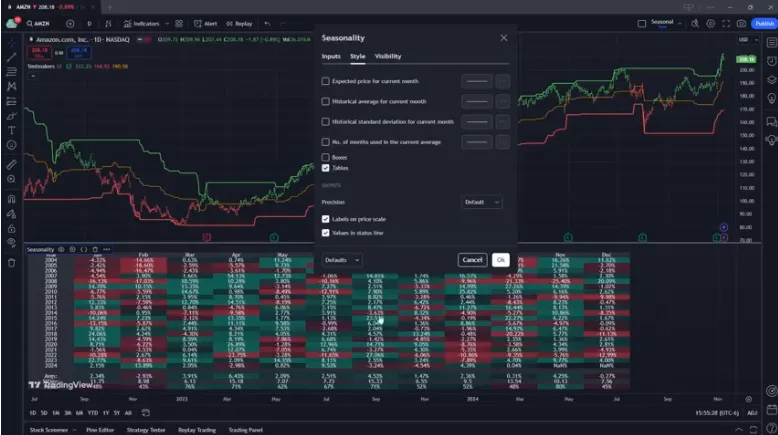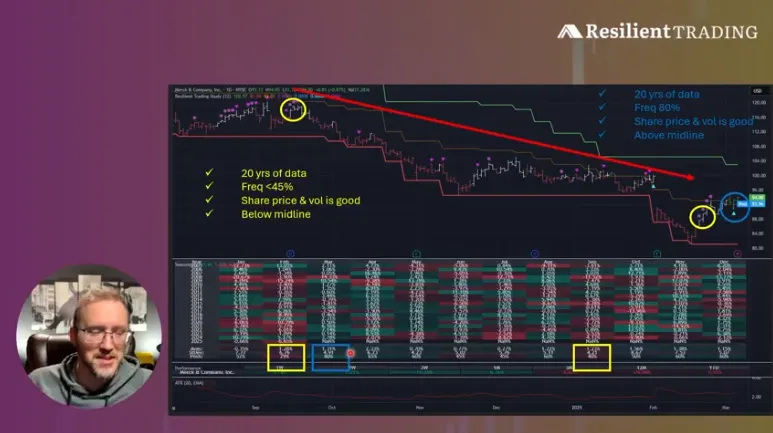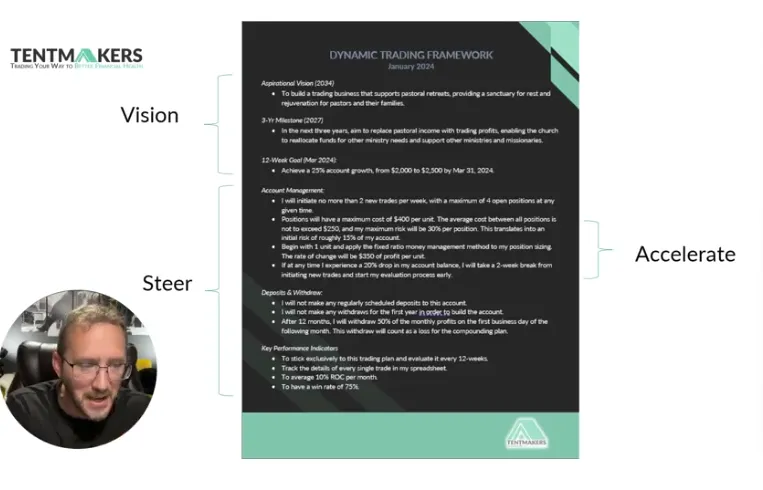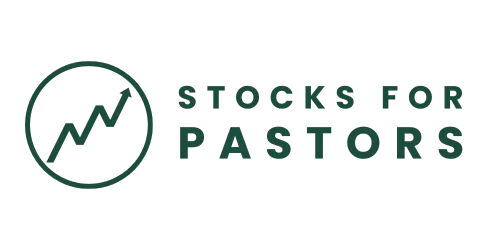A practical, pastor-friendly system for creating real cashflow from the market.
Build a trading business that pays you monthly, without stepping away from ministry

You Don’t Need Another Job. You Need a Paycheck That Works on Your Terms.
You’ve probably heard it before:
“Start a side hustle.”
“Pick up some extra speaking gigs.”
“Drive for Uber in your free time.”
But deep down, you know the truth: Your time is already maxed out.
What you need is margin. Not more hustle.
What If You Could Run a Simple, Part-Time Trading Business From Your Laptop?
The Income Plan is a complete system designed to help entrepreneurial-minded pastors create withdrawable income every month using options trading.
It’s not a hobby. It’s not guesswork.
It’s a repeatable process to build a lean, flexible business that pays like a second job—without pulling you away from your first calling.

You’ll know exactly what to do, when to do it, and how to manage it.
How It Works
This isn’t “set it and forget it” investing. This is business building, with tools, structure, and strategy.
Learn three simple strategies that power our 5–10% monthly ROI targets
Receive weekly trade alerts you can copy in minutes
Watch your account generate consistent monthly cashflow
Withdraw profits just like a paycheck
Grow your skills, build confidence, and scale at your pace
What's Included
When you join the Income Plan, you get full access to:
The Options Business Course:
Learn the full framework behind this income-generating model. Taught in clear, practical lessons.
Real-Time Trade Alerts:
Follow Michael’s actual trades each week. Know what to trade, when, and why.
Monthly Coaching Calls:
Get feedback, troubleshoot your trades, and grow with a like-minded community.
Templates & Checklists:
Run your trading like a system, not a guessing game.
Supportive Private Group:
Be part of a network of pastors and ministry leaders building the same kind of freedom you are.
Receive a $100 Bonus:
When you open your trading account with our preferred partner, you'll get a "thank you" gift deposited into your account.



Real Results. Real Income.
This isn’t theory. These are actual results.
Since launching the Income Plan in April 2023, Michael has placed 221 trades with a 79.6% win rate, using the same strategy shared in this program.
Started the portfolio in April 2023 with a $2,000 account.
Earned $11,437 in profit over 24 months!
Average Monthly ROI: 5.9%!
Average Monthly Income: $477!
Only 2 Losing Months: 91.7% winning months!
That’s not flashy day trading. That’s consistent, repeatable income—built with focus, discipline, and a strategy that works.
If a $2,000 account can generate nearly $12K in profit in two years, imagine what this could mean for your family, your ministry, or your financial peace of mind.

Here's the Best Part!
✅ You can do this in under an hour each week from a mobile device, wherever you are!
✅ You’ll never trade alone!
✅ You’ll always have a plan to follow!
PRICING
Choose Your Plan
Monthly
$197/m
Basics and Growth Plan included
Full access to the Options Business Course
Three high probability trading strategies to set you up for success in any market condition
Real-time trade alerts to follow step-by-step
Monthly group coaching calls for Q&A and support
Access to our members-only community
Downloadable checklists, templates, and guides
Ongoing support & updates
Get 2 months free with Yearly Plan
2 Free 1:1 coaching sessions with Michael

No contracts - cancel anytime
Annually (Best Value)
$1,997/yr
Basics and Growth Plan included
Full access to the Options Business Course
Three high probability trading strategies to set you up for success in any market condition
Real-time trade alerts to follow step-by-step
Monthly group coaching calls for Q&A and support
Access to our members-only community
Downloadable checklists, templates, and guides
Ongoing support & updates
Get 2 months free with Yearly Plan
2 Free 1:1 coaching sessions with Michael

No contracts - cancel anytime
For Pastors Who Think Like Entrepreneurs

Wants to provide more for your family without overextending your time
Believes financial margin creates ministry freedom
Is ready to treat income generation with the same intentionality as discipleship
Doesn’t want hype, just a method that works
Is willing to learn, apply, and grow
You're not just looking to invest.
You're looking to build something that gives back.
What Members are saying

“I can't tell you how awesome it felt to close my first winning trade! Knowing that when I clicked that button, I would be able to use that profit for a much needed date night with my wife. Thank you!”
Jon. H.

“I've been doing pretty good with the stocks plan, but learning how to trade options has taken things to a whole new level.”
Kyle C.

“This has been exactly the kind of side-hustle I was looking for. I needed someone I could trust to teach me how to get more time back and stop doing side gigs that take hours of my time and eat away at my ministry focus. Plus, I make more money with this. A double win!"
Ben C.
Imagine This...
What if you could earn an extra 5–10% every month from your trading account?
Not once in a while. Not someday. But consistently. Month after month. What would you do with that extra income? How would it change the way you care for your family? What would it free you from mentally, emotionally, even spiritually?
Maybe you'd finally take your spouse on that getaway.
Maybe you'd cover an unexpected bill without fear.
Maybe you'd support a missionary or fund a ministry dream that’s been on your heart for years.
Maybe you'd stop feeling like you're behind.
This isn’t about chasing riches. It’s about creating margin so you can serve God and others with peace and confidence.
Let’s build that future together!
Read Our Latest Blogs
Lorem ipsum dolor sit amet, consectetur adipiscing elit.

The Lie That Keeps Pastors Broke: Why Poverty Isn’t Spiritual
Let’s be honest: somewhere along the way, a lot of us in ministry got the idea that staying broke was somehow part of the job description.
We didn’t say it out loud. Nobody handed us a manual that said, "Welcome to ministry, hope you like stress and unpaid bills." But over time, this unspoken belief started to sink in: that being poor meant you were more spiritual, that lack somehow made you more like Jesus, and that struggling financially was just part of being faithful.
I know because I bought into it, too.
I accepted the pressure of paycheck-to-paycheck living. I convinced myself it was noble to wear financial stress like a badge of honor. I thought that glorifying lack was the way to show my commitment to God.
But let me tell you something: it wasn’t holy. It was heavy, and it was holding me back.
This article isn’t just about money. It’s about freedom. It’s about unlearning a lie that keeps pastors stuck in survival mode. And it’s about replacing that lie with biblical truth and practical steps forward.
So let’s talk about it, the false belief that staying broke makes you more spiritual.
Where the Lie Comes From
This mindset usually doesn’t start with bad intentions. It grows out of half-truths and misapplied Scripture.
We read about Jesus’ minimalist lifestyle: "Foxes have dens and birds have nests, but the Son of Man has no place to lay His head." We see Paul making tents to support himself. We hear stories of the early church selling everything to help one another. And before long, we start to connect holiness with hardship.
But here is the thing. Just because someone lived simply does not mean they were glorifying poverty. There is a huge difference between choosing simplicity out of obedience and assuming that struggle is the only faithful path.
We are not called to be poor; we are called to be prepared.
Somehow, we have taken these moments in Scripture and turned them into a permanent doctrine, believing that pastors are more spiritual when they have less.
That belief is simply not true.
What the Bible Really Says About Money
When you zoom out and look at the whole counsel of Scripture, a very different picture comes into focus. One of stewardship, multiplication, and even abundance—not for the sake of self-indulgence, but for the sake of others.
Think about it:
Abraham was extremely wealthy, and God used him to bless nations.
Joseph managed Egypt’s entire economy and used that position to save lives.
David died with enough wealth to fully fund the temple Solomon would build.
Jesus had wealthy supporters who funded His ministry (Luke 8:1-3).
Proverbs is packed with wisdom about saving, investing, and managing resources.
Even Paul, the go-to example for minimalism, spoke about experiencing both lack and abundance. In Philippians 4:12, he says, "I have learned the secret of being content in any and every situation, whether well fed or hungry, whether living in plenty or in want."
Notice what he does not say: that poverty is better. He says contentment is the goal, not complacency.
That is a big difference.
Being content does not mean you stop growing. It means you are rooted in Christ whether you are in a season of plenty or not. But it does not mean we should avoid pursuing financial health or stability.
How the Poverty Mindset Hurts Pastors
Let’s bring this down to real life. What actually happens when pastors believe that financial lack is part of the job?
Here is what I have seen and lived:
1. Chronic Stress
You are constantly calculating how to stretch each paycheck. The thought of an unexpected car repair, medical bill, or rising cost of living fills you with dread. There is no financial buffer, which means you are always on edge. This level of ongoing stress doesn’t just affect your mood; it can drain your energy, impact your sleep, and even affect your health and relationships.
2. Burnout
When the bills are piling up, you start saying yes to everything. You preach more, counsel more, take side gigs, and overextend yourself. Even good opportunities can become burdens if you are taking them just to stay afloat. Over time, you lose your passion, your creativity, and even your clarity about what God actually called you to do. The hustle becomes survival, not purpose.
3. Family Strain
Financial tension doesn’t stay neatly tucked away. Your spouse feels the pressure when they try to juggle groceries, bills, and kids' needs. Your children may not understand all the details, but they sense the worry. You might miss moments with them because you are always working. Or worse, when you are home, your mind is still consumed by what you cannot afford. This silent weight can lead to resentment, arguments, and emotional distance over time.
4. Shame and Guilt
You may feel like you are the only one struggling. You tell yourself, "I shouldn’t want more" or "Maybe I just need to trust God more." But deep down, you are wrestling with guilt over the very desire for peace and stability. That shame keeps you silent, and silence keeps you stuck. You feel isolated, embarrassed, and spiritually conflicted—as if wanting financial health somehow makes you less faithful.
5. Missed Opportunities
Without margin, you find yourself constantly deferring the things that would actually give you rest and joy. Sabbaticals seem out of reach. Family vacations become a luxury you can’t justify. Giving to others feels risky, not joyful. And when God stirs your heart to step into something new, you hesitate. Not because you lack faith, but because you lack funds. You begin to wonder if you are disqualifying yourself from opportunities simply because of what is missing in your bank account.
That is not holiness. That is just hard. And it wears you down.
Jesus did not rebuke people for having money. He rebuked them for worshiping it.
Reframing Wealth as Worship
So let us ask a better question: what if financial health is actually part of your spiritual leadership?
What if having margin allows you to lead better, give more, and model stewardship to your church?
God is not against money. He is against idolatry.
When wealth becomes a tool for kingdom impact rather than a source of identity, it becomes an act of worship.
Financial peace for a pastor does not mean chasing status or luxury. It means:
Saying yes to a calling without worrying about how you will pay the bills.
Giving freely to those in need, missions, and ministries.
Building in sabbaticals, family rest, and emotional margin.
Showing your church what it looks like to live wisely and generously.
That is not selfish; that is stewardship.
The Leadership Cost of Lack
Here is something I did not realize for a long time:
Financial peace is not a luxury for pastors. It is a leadership tool.
When your mind is consumed by money stress, it is harder to lead clearly. Your sermons come from a place of survival. Your counseling gets clouded by your own financial worry. You may start saying yes to things you should not because you need the income.
That is not a character flaw; that is reality.
But imagine if that changed.
Imagine leading your church from a place of peace, overflow, margin, and joy.
What’s Possible When Pastors Thrive Financially
Picture this:
You build a second stream of income using a simple, biblically sound system; something like our seasonal stock investing method that takes less than 15 minutes a week.
That extra stream covers your car payment or your kid’s school tuition. It lets you take your spouse on a trip.
You give anonymously to a family in need. You support missionaries without a second thought. You take a sabbatical without worrying if the bills will get paid.
You stop fearing the future because you have created margin, wisdom, and resilience.
That is not greed; that is freedom.
And yes, it is possible.
A Pastor’s Path to Financial Freedom
So how do you get there? What is the first step?
Here is what I recommend:
1. Renew Your Mindset
Start by rejecting the belief that poverty is your spiritual calling. That lie has no place in your life. Instead, embrace stewardship and multiplication as biblical disciplines. God has called you to lead, not just spiritually, but practically.
2. Learn a Simple System
You do not need to become a financial expert or spend hours studying charts. Start with a strategy that fits your calling. For example, our Seasonal Stock Strategy is designed for pastors who want to grow their income without sacrificing their ministry time.
3. Start Small and Build Slowly
Open a brokerage account. Put in what you can, even if it is only $100. The point is to start. Stay consistent and trust the process.
4. Join a Community
You do not need to figure this out alone. That is why we created Stocks for Pastors. To help leaders like you learn, grow, and support each other.
5. Teach What You Are Learning
As you grow, share it. Use what you learn to disciple others in your church financially. Help break the cycle for the next generation of leaders.
You do not need to love money; you just need to stop fearing it.
Final Thoughts: Faithfulness Is Not About Financial Struggle
The church does not need more broke pastors. It needs bold ones.
Pastors who lead with peace, who provide for their families with wisdom, and who multiply what they have been given so they can multiply their impact.
That starts by rejecting one dangerous lie: that less is always more.
Sometimes, more is your assignment.
If you are ready to stop surviving and start stewarding, we would love to walk with you. Check out www.StocksForPastors.com to learn more.
Because you were not called to scrape by. You were called to lead, and lead well.


